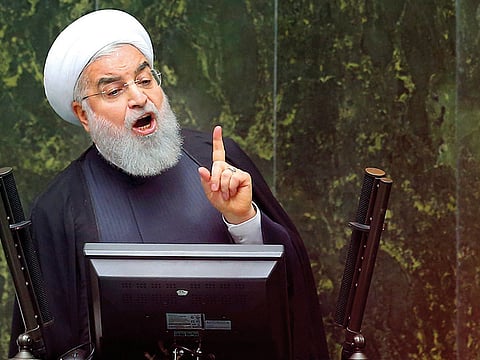US sanctions don’t go the full distance
Allowing 8 countries to keep importing oil from Iran gave Islamic republic some room

Last week, oil prices began to drop gradually to below $80 (Dh293.84) and reaching $72.5 per barrel despite the balance between supply and demand. The drop came at a time when the second set of US sanctions on Iran were being activated and targeting the energy and banking sectors.
The price drop did leave some analysts in doubt, yet everything became clearer as soon as the US administration excluded eight countries from these sanctions by last Friday. The excluded countries are among the key importers of the Iranian oil, accounting for around 70 per cent of its oil exports.
This means that there are no practical sanctions on oil exports. The Iranian response didn’t take long as President Hassan Rouhani said Iran will breach these sanctions.
How long will these “temporary” exemptions continue? Are there alternatives and deals that have not been announced? Everything will come to light soon and the resultant repercussions will affect the overall situation in the region.Dr Mohammad Al Asoomi, UAE economic expert
It remains ambiguous why the exclusion of the eight countries came after seven of them declared adherence to the US sanctions. Japan and South Korea, for example, have significantly reduced imports of Iranian oil and replaced it easily. Indian oil refineries also reduced their imports of Iranian oil.
Non-G8 countries such as Russia — which too has been excluded despite opposing the sanctions — have taken practical measures to stop dealing with Iran in the energy field.
Russia’s state-owned enterprise Zerobig Naft reported that it decided to withdraw from two projects to develop Iranian oil fields worth $674 million.
Non-G8 countries such as Russia — which too has been excluded despite opposing the sanctions — have taken practical measures to stop dealing with Iran in the energy field. Russia’s state-owned enterprise Zerobig Naft reported that it decided to withdraw from two projects to develop Iranian oil fields worth $674 million. Iraq, also seen as an ally of Iran, said it was gearing up to stop Kirkuk oil exports to Iran because of the sanctions.
Turkey and India, the only countries to officially request exemption from the sanctions, said their companies too decided to adhere to the sanctions. Turkey’s Petrol Ofisi, for instance, refrained from supplying Iranian planes with fuel at Istanbul airport. Prior to that, EU companies withdrew one by one from Iran, meaning no one could sacrifice their interests on behalf of a rogue state.
Perhaps, the US sudden exemption is aimed at giving Iran’s regime some time to reconsider its stance as the sanctions are mainly aimed at stopping the support of terrorist organisations and Iran’s interference in other countries’ affairs, the last of which was in Denmark, which has now recalled its ambassador from Tehran.
Also, it has to be highlighted that excluding the most important importers of Iranian oil allowed Tehran’s regime to heave a sigh of partial relief and get a short period of reflection to either escalate or review previous positions and end defiance of the international community.
Will that open doors for compromises? In particular, as the US justifications are not convincing that the exemptions are temporary and will be there until balance in the oil market is resorted.
Will that open doors for compromises? In particular, as the US justifications are not convincing that the exemptions are temporary and will be there until balance in the oil market is resorted. However, the facts point the other way round — the oil market is well balanced, particularly after Russia and Saudi Arabia raised their production to over 11 million barrels per day for each. Unless what the US meant is the balance of balance itself, or a double negative as in philosophical science.
There are certainly other effective sanctions, but will not be of that kind, which breaks the camel’s back, that is, that of the Iranian regime. These include suspending Iran’s transactions along with its companies from the SWIFT payment network and ceasing foreign investments in the oil, shipbuilding and maritime transport sectors.
These include suspending Iran’s transactions along with its companies from the SWIFT payment network and ceasing foreign investments in the oil, shipbuilding and maritime transport sectors.
Yet, these will not to affect the oil sector, which constitutes more than 60 per cent of Iran exports and 40 per cent of government revenues.
How long will these “temporary” exemptions continue? Are there alternatives and deals that have not been announced? Everything will come to light soon and the resultant repercussions will affect the overall situation in the region.
Dr Mohammad Al Asoomi is a UAE economic expert and specialist in economic and social development in the UAE andthe GCC countries.



